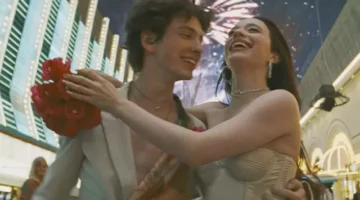Tropic Sprockets
BY IAN BROCKWAY
In director John Turturro’s (Passione) fifth film “Fading Gigolo,” you might think you just stepped into Woody Allen’s Yiddish yore. And you would almost be right. John Turturro stars here in his own unapologetically silly story about an under-employed New York florist, Fioravante and his meek but imaginative, excitable friend, Murray, a septuagenarian bookseller (Woody Allen).
Fioravante is in need of money, without a place to stay. Through an overheard conversation with a doctor, Murray gets the idea to make Fioravante into an instant escort to secure his friend’s expenses. Allen gives many one liners some of them funny and others a bit flat, mostly hamming up the oft-repeated concept of his own nebbish and unassuming persona transformed (somewhat) into a figure of importance.
As if to take a cue from Larry David’s “Curb Your Enthusiasm'” Murray has a black step-family and while this could well have some meaning and humor, not one of his family members are given any depth. Allen’s role is chiefly delivered to give an excitable and aghast counter to Fioravante’s zen passivity. One line that works is about Fioravante’s sex appeal and mentions Mick Jagger. “Look at Mick…he’s old and when he opens his mouth, he’s a horror but he’s got it..like you..you have it.”
It is Allen’s delivery that will make you laugh even if the stumbling cajoling attitude is all too familiar. Suffice to say, Murray convinces Fioravante to be beefcake for hire. Our sensitive hunk turns up at appointment after appointment, ravished by a cougar cartoon in the form of Sharon Stone and the Jessica Rabbit racked Sofia Vergara whose breasts qualify for soft porn.
A soft spoken and self-absorbed Orthodox widow, Avigal, (Vanessa Paradis) who teaches at a yeshiva is drawn to the interior Fioravante and makes an appointment. Chemistry sparks. Paradis with a singular verve does excellently in this role as a sheltered and yearning woman who struggles to let her actual hair fly unrestrained, forbidden under orthodox rule.
These scenes alone have a vibrant heart. This poignance gets bogged down however, by a stale and tepid bit involving Murray getting hauled in by the Shomrim guards to face excommunication. While this might raise a titter or two among those unschooled in Allen’s oeuvre, even the most steadfast of the auteur’s fans will find this trite, as Allen has done this bumbling and Kafkaesque Why-me shtick before facing a grizzled and scornful council of rabbis.
Turturro plays it sincerely enough in the title role but we are given only sketchy details as to what really matters to this man who can go from cold Casanova to a blossoming and introspective romantic with an acrobatic agility. What of Fioravante’s past? Murray’s? Or Dovi’s, the Shomrim guard. As Avigal is the only full fleshed character, what unfolds is a New Yorker cartoon. As light as these exchanges are Turturro and Allen do have amiable charm which goes a while, despite things going a little too wack in Williamsburg.
The most heartfelt subtext to “Fading Gigolo” is the grimness of favorite hangouts closing down and disappearing, from soda counter, bistro and bookshop, permanently and forever. Forget the brash women and the hesitant happenstance. The real pathos here is a nostalgia for a lost New York. Fioravante functions best as a poetic sentinel: inward, yet fiery, wanting to protect the last of his beloved neighborhood’s urban seltzer.
Nymphomaniac: Volume II
When we last left Joe (Charlotte Gainsbourg) she was entrenched in a philosophical debate with her rescuer of sorts, a Mr. Seligman (Stellan Skarsgard) and unable to feel any erotic sensation. In this second installment, she intently relates more of her story.
She is stuck in neutral with her hubby (Shia LaBeouf) and at a loss. She becomes increasingly despondent. Gainsbourg’s role echoes her previous outing in “Antichrist”. Joe seeks out a sexual misadventure soliciting sexual company with two African men.
Passive and silent, she observes a hostile argument and in barely a minute’s time, she is sitting bemused between a pair of erect penises. The position of the bed and the erect members turns the screen into an x-rated Matisse tableau. Frustrated and bereft, Joe joins a twelve step program and strips her room of all color and charm. This fails when she verbally eviscerates the group. What a woman.
Joe has a baby but just when any other mother might have a yen for flowers, an overhead reflection shows the baby smiling devilishly with animal eyes in a hint of Rosemary.
Needless to say, the mother bond is not established. Joe falls in with a creepy laconic fish (Jamie Bell of Billy Elliott) who specializes in sadism. She is literally in knots as Bell’s methadone monster only slightly licks his lips.
While this is told, Seligman appears more and more excited, yet he tells an oddly mundane counter story about a doomed mountain climber with only shoelaces to save himself. Suffice to say these two characters are left in their own solipsistic bubbles, within a room of brown flypaper, disinterested and never connecting with each other. As usual there are some poetic passages. Seligman falls from an ocean of books, his body spinning ala Hitchcock.
Joe was once a kind of sexual saint, her body levitating in the style of a Ken Russell music opera, but now she is cynical, bruised and battered, purple with piss. The cyclic philosophic banter reaches an almost absurdist pitch as the two characters are each on their own trajectory: Joe driven to reach a nirvana of amorality and Seligman obsessed with theological history and numerology, using any obscure fact necessary to wake himself from his doughy torpidity.
At the end, director von Trier appears to toy sadistically with his detractors by showing Jo’s infant Marcel about to take the plunge below as in “Antichrist”. Or perhaps it’s a personal exorcism. Either way, von Trier does his best to push buttons. We also have a snide Willem Dafoe as a loan shark, along with the eerie cult actor Udo Keir as a waiter who comically witnesses some scandalously falling spoons but hardly says a word. With the last of “Nymphomaniac” we still don’t know quite what drives these crepuscular characters and maybe we don’t need to. As in the work of Michael Haneke, von Trier leaves the work to us and the questions left make the momentum, be it either Manichean or impartial in origin.
Write Ian at [email protected]
[livemarket market_name="KONK Life LiveMarket" limit=3 category=“” show_signup=0 show_more=0]





No Comment